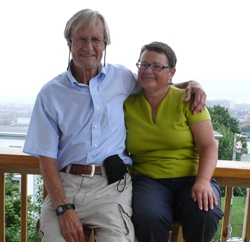From the sitting room of their third-floor walk-up on Portland’s Munjoy Hill, David Body and Elizabeth Miller can watch the tugboats return to their berths and the ferries head from the waterfront to Peaks and Long islands. Having met in their middle years, at turning points in their lives, the couple feels comfortable knowing that they are doing what they want to do: teach.
 Body and Miller had full careers before turning to teaching. Body ran his own advertising company; Miller had been a curator, ultimately becoming director of the Maine Historical Society. Then both had had enough. Tired of administration, Miller became a teacher in her forties. Encouraged by Miller, Body worked as a substitute teacher, then as an education technician. Eventually, he became certified as a special education teacher.
Body and Miller had full careers before turning to teaching. Body ran his own advertising company; Miller had been a curator, ultimately becoming director of the Maine Historical Society. Then both had had enough. Tired of administration, Miller became a teacher in her forties. Encouraged by Miller, Body worked as a substitute teacher, then as an education technician. Eventually, he became certified as a special education teacher.
The couple’s passion for teaching pervades their lives. They frequently talk about the obstacles their students must overcome because of learning disabilities and language barriers. As they talk, what emerges is inspiration. They marvel that while they had always known the power of education, they had never seen so clearly how schools — combined with the kids’ own efforts — could turn lives around.
When Body and Miller began to work through the financial arrangements that come with joining lives, they began to think of their legacy. Neither had children. Both had lists of issues they cared about. They eventually realized that what they wanted to do was an extension of the work they had embraced, to use their money to encourage students to continue their education.
They turned to the Maine Community Foundation to establish the David W. Body and Elizabeth J. Miller Scholarship Fund. They felt that MaineCF was the only organization that could handle their requirements and accept their directives. Miller had had contact with the foundation through the Maine Historical Society. “I knew their track record,” she said.
The scholarship fund will support residents of Portland or South Portland who have been in special education or ESL (English as a Second Language) classes and long to continue on. “It could be any kind of post-secondary education,” Miller insists, “hairdressing, vocational, whatever their paths may be.” And there are no age constraints. “Whether they are 18 or 48,” says Body, “we want to help students who have the ambition to undertake some education to better themselves.”
Body recalls a recent adult education graduation he attended with Miller. “It was an emotional experience,” he says; “They spoke about what they had to overcome.” Imagining future students graduating from technical schools, community colleges, and universities, the couple can be pleased with the part that they will play, making a difference in someone else’s life when it truly matters.





